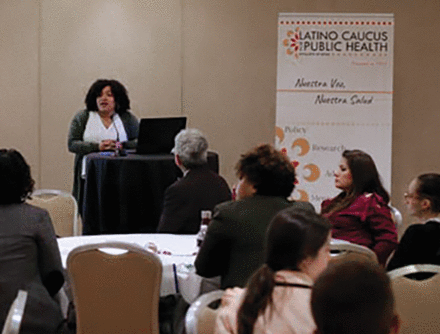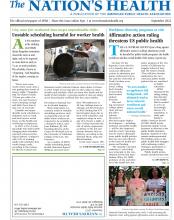
Jose Pietro Aparicio, MD, MPH, and Andrea Jacobo, DrPH, MPH, work at the Caucus’ Public Health Expo booth in 2019.
Photo courtesy Latino Caucus
In 1973, farm labor crusader Cesar Chavez was invited to speak at APHA’s Annual Meeting in San Francisco. Unfortunately, Chavez’s presentation was scheduled for a small meeting room. Seeing the oversight as a form of disrespect for the legendary Mexican-American, a group of APHA members picketed outside the venue and in the halls, and took the protest to the Association’s Governing Council. By the end of the meeting a new APHA entity — the Chicano Latino Caucus — was born.
The following year, the small group met again and formally changed the organization’s name to the Latino Caucus, recalled J. Henry Montes, MPH, a founding member who joined the Latino Caucus in 1975.
“Latino issues of public health were not very well known in those early years, except by the people who worked with Latinos,” Montes told The Nation’s Health. “As the Caucus got involved more, it allowed APHA to be more aware of what those issues were.”
Fast forward to 2023 and APHA’s Latino Caucus for Public Health now boasts more than 800 members and a 50-year history of advocating for the health interests of Hispanic people across the Americas. The Caucus provides leadership opportunities for students and young professionals and shares key research findings on health issues affecting Hispanic people so that they can inform advocacy and influence reform.
The Caucus has served as the APHA home to three Association presidents: José Ramón Fernández-Peña, MD, MPA; Carmen Nevarez, MD, MPH; and the late Helen Rodriguez-Trías, MD, a social justice luminary whose commitment to helping underserved and disadvantaged populations has been immortalized in an APHA-wide social justice award that bears her name. Work on getting APHA Executive Board approval for the award was initiated by Montes, who received assistance from former Latino Caucus president Louise Villejo, MPH, CHES.

Vanessa Torres, PhD, MPH, second from left, receives a Latino Caucus award in 2019 for outstanding student paper.
Photo courtesy Latino Caucus
“I am a member of other APHA Sections and Caucuses, but the Latino Caucus remains my base,” Fernández-Peña told The Nation’s Health. “It grounds me. It was the first component that welcomed me into APHA. In it, I found mentors, colleagues, friendships and, later on, opportunities to be a mentor to younger colleagues.”
Over the years, the Latino Caucus has been an “incubator of new academicians and policy statements,” elevating the concerns and issues of Hispanic people to the larger platform on which APHA stands, Fernández-Peña said, noting that the population in the U.S. is diverse.
For many decades, immigrants drove the U.S. Hispanic population. But today, most Hispanic people in the U.S. were born in the country, noted Latino Caucus President Cynthia Lebron, PhD, MPH. And numbers are growing: According to the U.S. Census Bureau, 19% of the U.S. population self-identified as being of Hispanic or Latino ethnicity in 2020.
“If you’re still talking about Latinos as synonymous with immigrant health, that’s not going to be exactly right because the population is evolving and the science needs to evolve with it,” she told The Nation’s Health.
The Latino Caucus anniversary will be in the spotlight at APHA’s 2023 Annual Meeting and Expo in Atlanta in November. Anniversary events include six oral sessions, two roundtable sessions and four poster sessions. The Caucus’s Latinx Young Professionals group will host a social event on the evening of Sunday, Nov. 12, and the Helen Rodriguez Trias Breakfast will be held on Tuesday, Nov. 14. The Latino Caucus’s 50th Anniversary Gala will be held on Tuesday evening. Meeting attendees can stop by the Latino Caucus booth in the Public Health Expo to connect with members and learn about activities.

José Ramón Fernández-Peña, MD, center, a past APHA president, visits the Caucus booth at 2013’s Annual Meeting.
Photo by Michele Late
Public health professionals do not have to wait until the Annual Meeting to get involved with the Caucus, as it engages members year-round. One of its offerings is its podcast, which launched in 2020.
Coming to APHA for the first time in 2019 as a PhD student, Lebron said she quickly realized that most of her counterparts in the Caucus’s newly formed Latino Young Professionals committee shared stories similar to hers. Many were first-generation Americans with no knowledge of how to launch a public health career and no one in their families to look to for guidance.
“Along the way, we started talking about our stories, and we thought that it would make a good podcast and that people would relate to it,” she said.
Now in its third season, the podcast series shares stories about growing up, mentors, and members’ paths to public health.
“People have reached out to us and told us that they love the podcasts,” Lebron said. “They love to hear the stories because they don’t feel alone. It’s very similar to their stories. And that’s exactly what we wanted it to be.”

APHA 2019 attendees take in a Latino Caucus event at the 2019 Annual Meeting.
Photo courtesy Latino Caucus
The Latino Caucus is also fulfilling its mission through another form of storytelling, namely poetry. Working with Caucus colleagues, Alvaro Garza, MD, MPH, in 2019 conceived and led an effort to publish a book of poems related to the health of the Hispanic community. Intended as a fundraiser for the Caucus, the book includes 58 poems from 17 contributors, most of them Caucus members and health professionals.
Garza said he will bring copies of the book to APHA’s 2023 Annual Meeting and Expo to seed new interest in other artistic collaborations.
Hispanic health and the Caucus anniversary will also be highlighted in APHA’s American Journal of Public Health. Thanks to funding from the Robert Wood Johnson Foundation, the Latino Caucus and the Center for Latino Health Research Opportunities will publish a supplemental issue in 2024 on emerging issues in Hispanic and Latino health.
For more information on the Latino Caucus, visit https://latinocaucus-apha.org. To browse the Caucus’ Annual Meeting schedule, access the event program at www.apha.org/annualmeeting.
- Copyright The Nation’s Health, American Public Health Association












